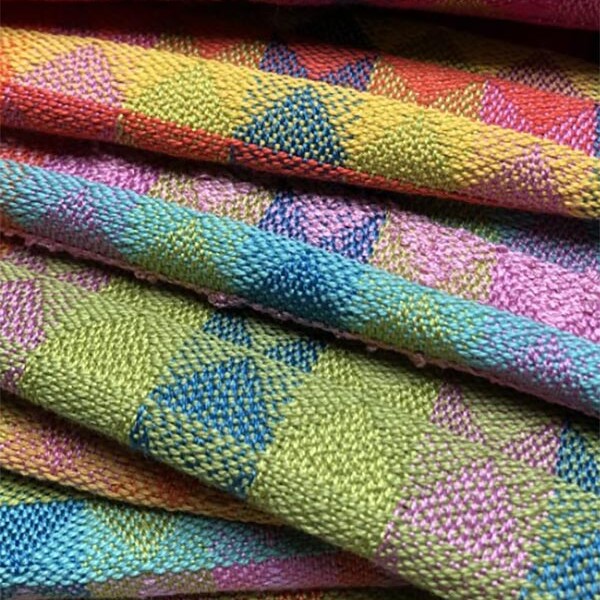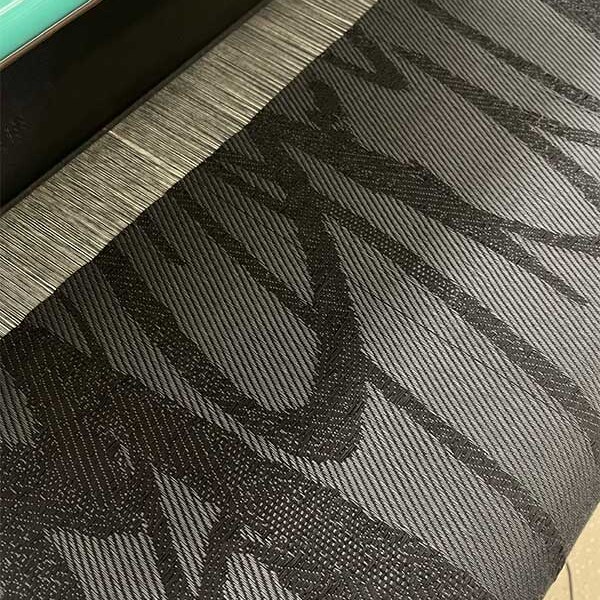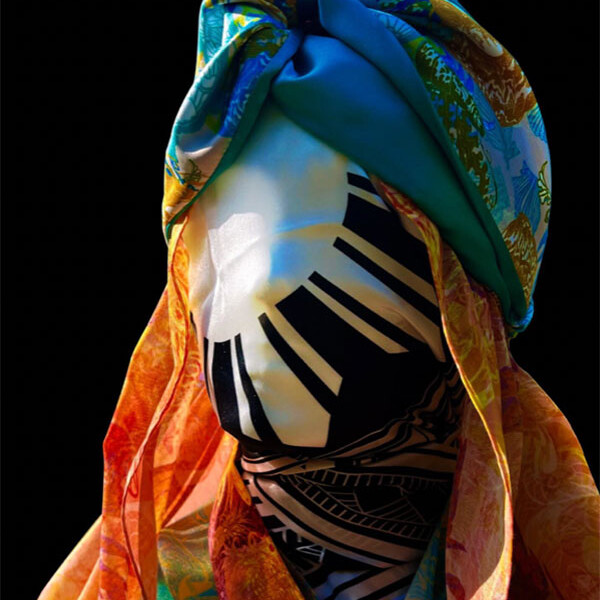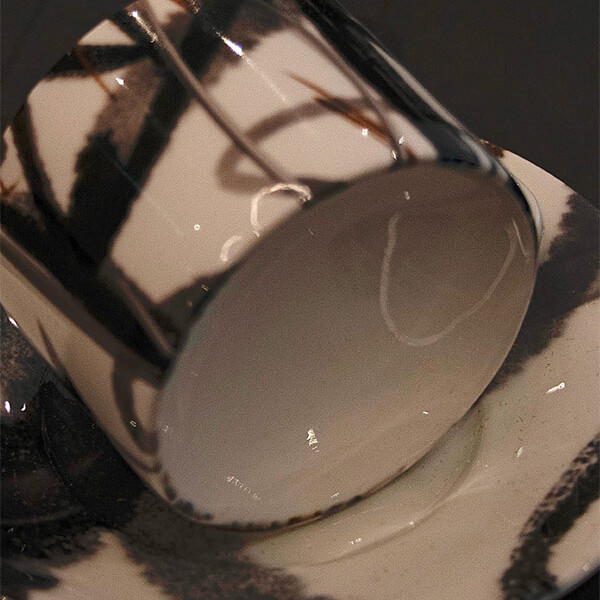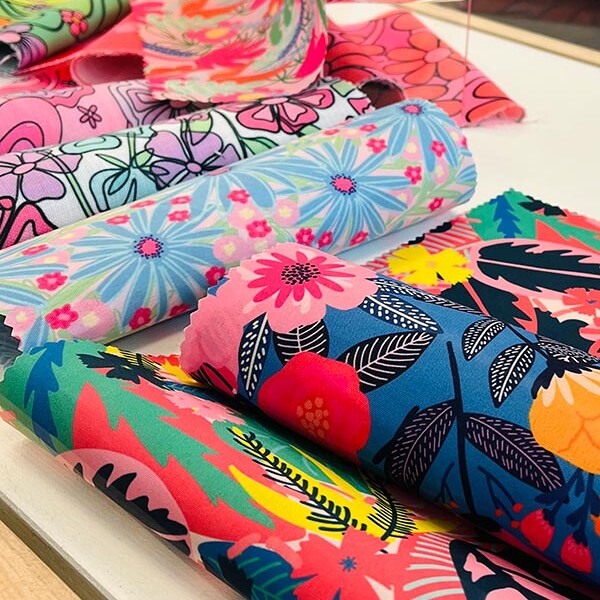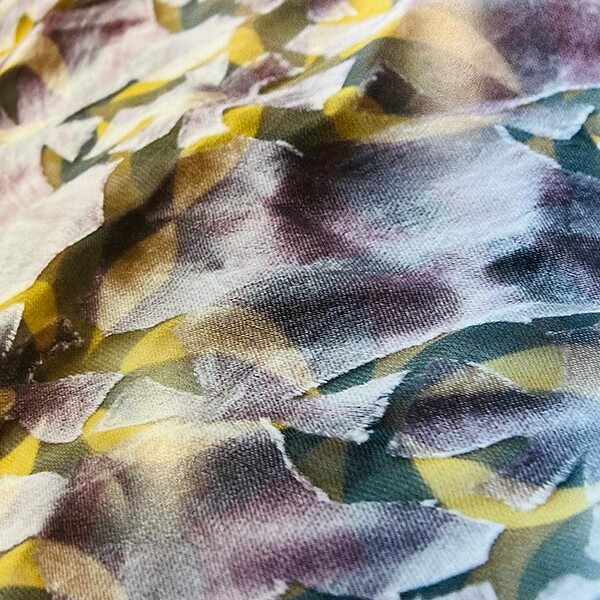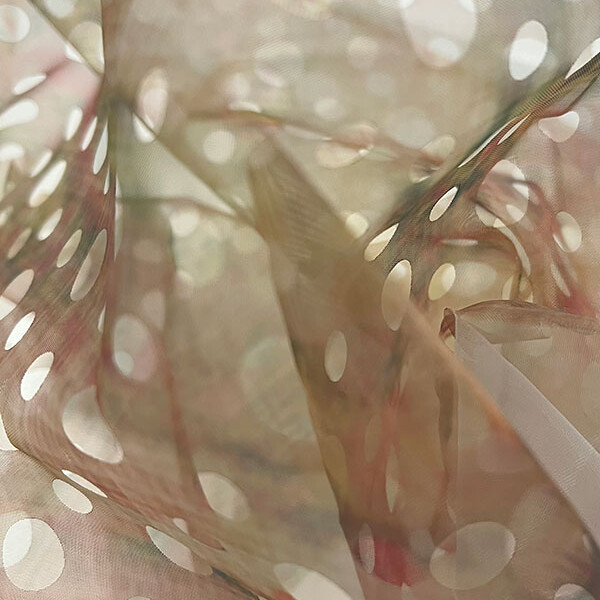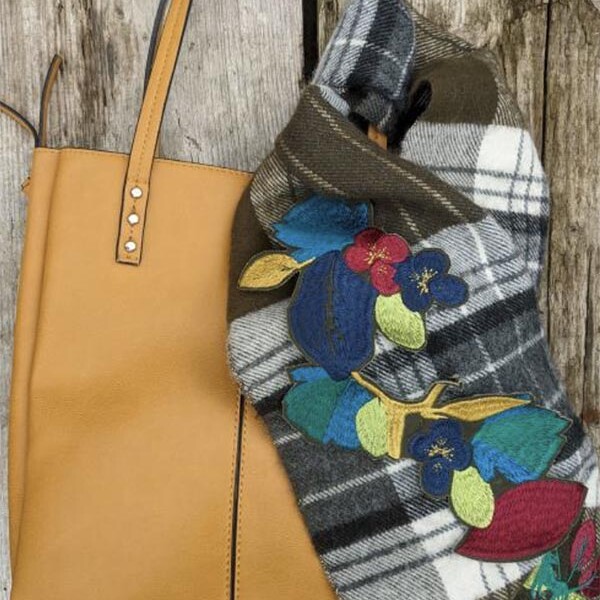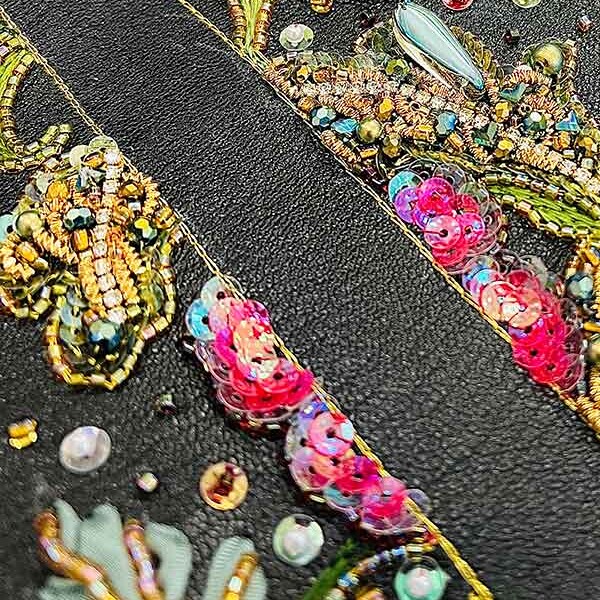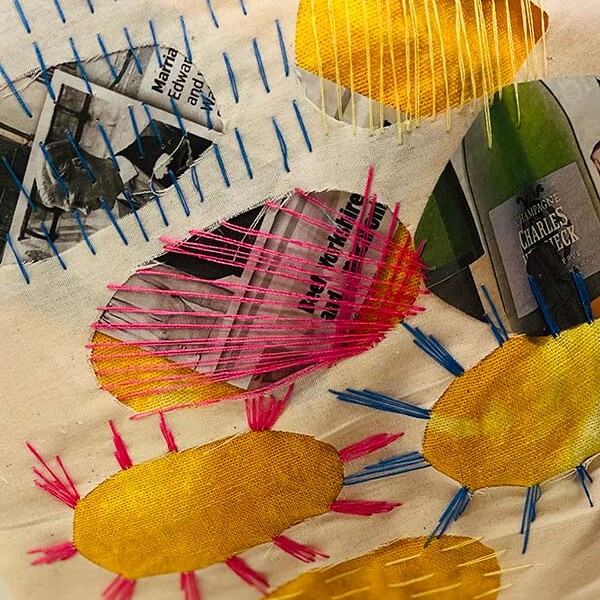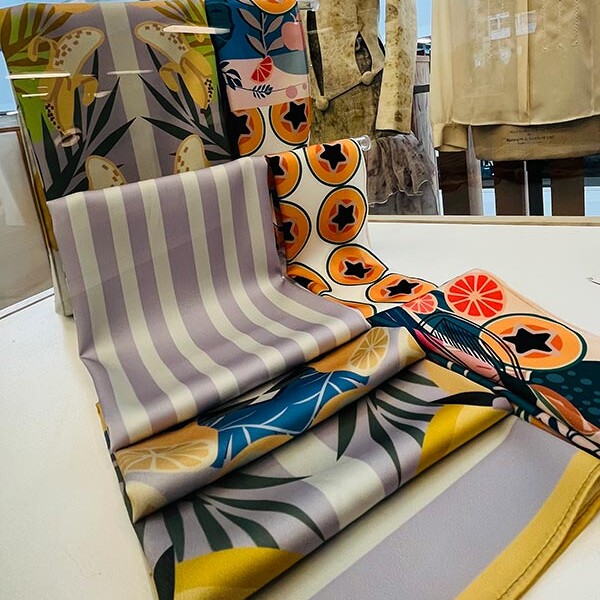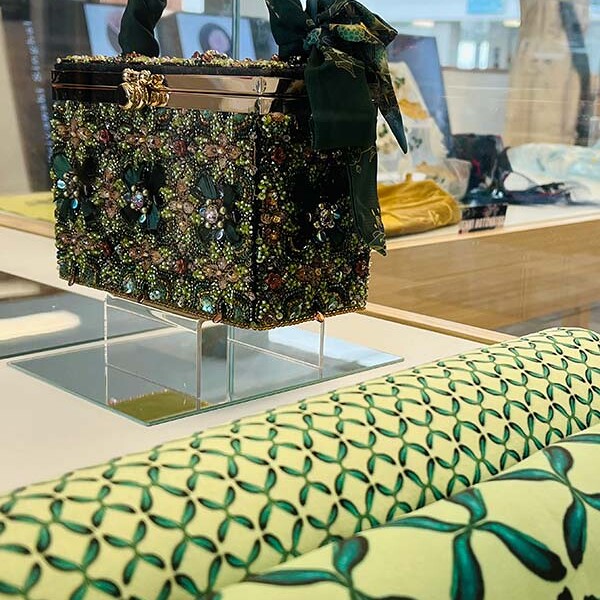Textile and Surface Design - MA
Currently viewing course to start in 2025/26 Entry.
This course offers access to extensive workshops facilities to equip you with the knowledge and skills necessary to launch your career in the textile and surface pattern industries. The choice of materials, processes and markets is up to you. You can develop a range of products to establish your own business or create a professional portfolio. You do not need a background in textiles to embark on this course.
- Level Postgraduate Taught
- Study mode Full Time
- Award MA
- Start date September 2025
- Fees View course fees
- Subjects
- Location City Centre
This course is:
Open to International Students
Overview
MA Fashion Show at BCU.mp4
[00:00:17] Speaker 1 My MA experience was purely a brilliant experience because I came to this new country and it was really easy for me to make friends being an extrovert. The people here are very friendly and overall my fashion experience has taught me a lot of things. I explored so many new workshop options, collaborations and teamwork.
[00:00:46] Speaker 2 The highlight of the MA Fashion Design for me throughout the entire year was the fact that I get to collaborate with a lot of people, it's helped to expand my sort of my personal horizon, but also to help me get a lot more skill set throughout the course as well. BCU has such a diverse culture for a university, so like I can express myself a little bit further because as you know, my background originally from Vietnam was like, you know, it's just amazing to see like so many people, but also get to collaborate with them. Improving my my skill set throughout my major projects so much that the result of my outcome is really positive.
[00:01:30] Speaker 3 I think I have really wonderful studying experience here. Also, like the technician, they help us a lot about if we don't have idea about a sewing machine, we don't put the all very well about the button hole or something. Yeah, a story details things. So I think there's a lof of supporting here.
[00:01:58] Speaker 4 I think tonight will be very exciting because we have a fashion show and me and my friend make our garments and prepared for a really long time and we are really looking forward to it and I think it will be a really great experience. And for my feature and for my future work for a job like this.
[00:02:21] Speaker 5 So really after this MA, I want to build my own business. So it's through this course I was able to participate in entrepreneurial programs, mainly through STEAMHouse. I've also done mentorship programs with people who have had their own businesses, so I'm very grateful that through BCU I was able to tap those resources.
[00:02:46] Speaker 6 So the highlight for me in this MA study is, first of all, I got new friends here and they are very friendly and we often like help each other to do some draping work and some sewing work. During the break time, we will get together to have a meal together or something like that. And also during our semester break I can went to Europe because it's very convenient to travel from UK to Europe. And I so I went to so many countries in Europe and see many beautiful sceneries de.
[00:03:31] Speaker 7 The course MA Design in BCU helped me to get into the industry by like getting a different knowledge of materials, not just only textiles, but also different material like wood and also the bio material that I developed. And it helped me to improve into the colour material and CMF, like finished design of CMF in the industry, so it helped me to get involved into the interior and exterior design and also the industrial design as well.
The Fashion and Textile Design Masters Programme unites craftspeople, artists, and designers passionate about studio- and workshop-based practices. You will join a diverse student body, including recent graduates and experienced professionals, all driven to deepen their knowledge and skills in their chosen specializations.
The dynamic nature of the creative sector, combined with the diverse cultural perspectives and experiences of our students, makes this course highly engaging. Our faculty members bring a robust blend of academic, research, and professional practice backgrounds to their teaching.
What's covered in this course?
Distinctive features of our course
- Self-defined study content: Flexibility to shape your own study content.
- Project management approach: Emphasis on project management over traditional subject-based learning.
- Vocational pragmatism: Focus on practical vocational needs.
- Diverse student body: Opportunities to learn within a culturally rich student population.
- Comprehensive support: Access to a wide range of practices and specialisms.
Key pillars
- Sustainability and craftsmanship: Emphasis on sustainable practices, considering environmental impacts, and exploring sustainable materials. Traditional skills and techniques are valued, promoting high-quality, artisanal work.
- Innovation and research: Encouragement to engage in innovative design and research, pushing the boundaries of fashion and textiles. Integration of cutting-edge technologies and contemporary methodologies fosters a forward-thinking mindset.
- Enterprise and entrepreneurialism: Cultivation of an entrepreneurial spirit, preparing you to launch and manage your ventures. Modules on creative ideation, collaborative challenges, and personal development equip you with the necessary skills.
Course structure
- Certificate modules: Focus on creativity, project control, and idea generation.
- Diploma modules: Orientation to professional practice, industry relevance, and cultural awareness.
- Master's modules: Emphasis on detail, integrated professionalism, and advanced practice.
Career development
Our course prepares you for contemporary design roles and continuous professional development. With a proven track record of enabling students to progress to doctoral-level research and significant career milestones, you will develop analytical skills, tactical thinking, and professional behaviour. Our critical environment encourages alignment with your career aspirations, fostering a purposeful and self-sufficient approach.
Programme outcomes
By the end of this programme, you will have:
- Developed a comprehensive portfolio.
- Gained extensive industry insights.
- Cultivated a strong entrepreneurial mindset.
- Be ready to make a significant impact in the fashion and textile industries.
After finishing my Bachelors, the MA Textiles and Surface Design course really allowed me to grow as a designer, encouraging independence and creativity. It was a chance to further develop my design style, technical knowledge and boost my confidence.
The facilities are amazing at BCU, and the university puts so much into helping you achieve your goals. For example, I already used Wilcom Digital Embroidery in my Bachelors, but I spent a lot more time specialising in the technique and developing advanced skills. The course also initiated live projects, collaboration and internships which I had wanted to explore - and will now help towards building my career in the future.
Jennifer Hotchkiss
Why Choose Us?
- Study with a globally respected provider of education in fashion and textiles.
- Benefit from a unified programme and work alongside textile, fashion and surface designers.
- Access a wide range of facilities, including digital print and a Gerber fashion CAD suite.
- Network and collaborate with other fashion students, our wider postgraduate community and beyond.
- Enjoy a vast archive of fashion publications dating back to the 1930s.
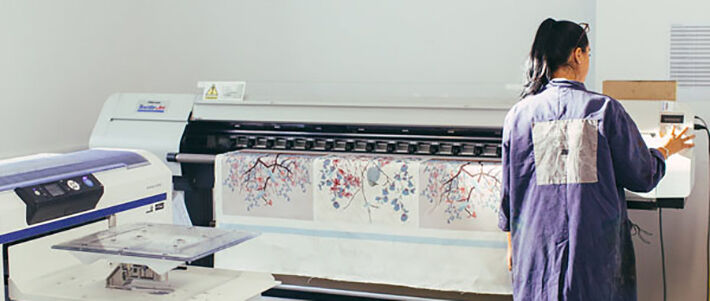
Similar Courses
OPEN DAY
Join us for an Open Day where you'll be able to learn about this course in detail, chat to students, explore our campus and tour accommodation. Booking isn't open for this event yet, register your interest and we'll let you know as soon as booking goes live.
Next Event: 28 June 2025
Entry Requirements
Essential requirements
Applicants are normally expected to have a minimum of a 2:2 honours degree, or equivalent, in Textile Design or closely related subject area, such as visual communication, fine art, craft, or product design. Equivalent professional experience will also be considered on an individual basis.
Applicants will also need to submit a digital portfolio that shows examples of creative visual work, including developmental work and final outcomes. The portfolio should include 3-4 projects highlighting your area of practice.
Applying with international qualifications
See below for further information on applying as an international student.
If you have a qualification that is not listed, please contact us.
Fees & How to Apply
UK students
Annual and modular tuition fees shown are applicable to the first year of study. The University reserves the right to increase fees for subsequent years of study in line with increases in inflation (capped at 5%) or to reflect changes in Government funding policies or changes agreed by Parliament. View fees for continuing students.
Award: MA
Starting: Sep 2025
- Mode
- Duration
- Fees
- Full Time
- 1 year
- £10,000 in 2025/26
- Full Time
- 18 months (including Professional Placement - see below*)
- £11,000 in 2025/26
International students
Annual and modular tuition fees shown are applicable to the first year of study. The University reserves the right to increase fees for subsequent years of study in line with increases in inflation (capped at 5%) or to reflect changes in Government funding policies or changes agreed by Parliament. View fees for continuing students.
Award: MA
Starting: Sep 2025
- Mode
- Duration
- Fees
- Full Time
- 1 year
- £18,600 in 2025/26
- Full Time
- 18 months (including Professional Placement - see below*)
- £20,460 in 2025/26
Application deadlines
We advise you to apply early to allow sufficient time for you to prepare to start your studies in September. Please apply by Friday 18 July to allow time to arrange accommodation, student finance and visas where required.
Late applications will be accepted where places are still available, but please note that Welcome Week begins on Monday 15 September 2025, and teaching begins on Monday 22 September 2025. International students are invited to arrive from Monday 8 September 2025.
To find out more, see our application timeline.
Portfolio guidance
If you receive an offer to study this course, you will be required to submit a portfolio. We ask that this is submitted within four weeks of receiving your offer.
Please see our portfolio guidance page for tips on putting your portfolio together.
Portfolio guidance
If you receive an offer to study this course, you will be required to submit a portfolio. We ask that this is submitted within four weeks of receiving your offer.
Please see our portfolio guidance page for tips on putting your portfolio together.
Personal statement
You’ll need to submit a personal statement as part of your application for this course. This will need to highlight your passion for postgraduate study – and your chosen course – as well as your personal skills and experience, academic success, and any other factors that will support your application for further study.
If you are applying for a stand alone module, please include the title of the module you want to study in your Personal Statement.
Not sure what to include? We’re here to help – take a look at our top tips for writing personal statements and download our free postgraduate personal statement guide for further advice and examples from real students.
Course in Depth
Modules
In order to complete this course you must successfully complete all the following CORE modules (totalling 140 credits):
Advanced Research Skills 20 credits
Material, Process and Ideation 40 credits
Professional Futures: Collaborative Challenge 20 credits
Project Resolution and Collection Launch 40 credits
Reflection 20 credits
In order to complete this course a student must successfully complete at least 40 credits from the following indicative list of OPTIONAL modules.
Fashion: Innovation and Technical Development 40 credits
Textiles: Consolidating your Creative Practice 40 credits
Core modules are guaranteed to run. Optional modules will vary from year to year and the published list is indicative only.
Professional Placement
In order to qualify for the awards with Professional Placement, a student must successfully complete all of the Level 7 modules listed above as well as the following Level 7 module:
This module is designed to provide you with the opportunity to undertake a credit bearing, 20-week Professional Placement as an integral part of your Master’s Degree. The purpose of the Professional Placement is to improve your employability skills which will, through the placement experience, allow you to evidence your professional skills, attitudes and behaviours at the point of entry to the postgraduate job market.
Download course specification
Download nowYour learning will be based around studio and workshop practice, with personal programmes of study and joint lecture and seminar programmes. Art, craft and design interpretations of the disciplines are all supported and our highly experienced course team recognise the importance of having a personal and distinctive approach to your work and study. There are also ample opportunities to collaborate, exchange ideas and broaden your perspective.
There is a wide range of conventional and CAD facilities available including digital print, digital Jacquard and 3D printing and laser cutting workshops. There are also specialist facilities available in glass and ceramics.
You’ll develop creative and practical skills which are ideally suited to gaining a career in textile and surface design.
Learning through studio and workshop practice, you’ll also benefit from our close connections with manufacturers, and get to experiment with a wide range of materials to create new and innovative products and design ideas.
To support your learning you are encouraged to develop links appropriate to your studies, these have previously included DuPont, Emap, Sandersons and Ensell and Hall.
Assessment methods
Your programme will include a mixture of practical projects and written work. You will develop a portfolio of work that showcases your abilities and ideas and is executed and managed in a professional manner.
At each stage you will also write reports that encourage you to develop a critical and contextual framework within which to understand your practice and future career choices.
You are assessed using a mixture of tutorial reviews, project work submissions and oral exams.
Classroom projects
You will be given opportunities to work alongside your peers in the wider Postgraduate Fashion and Textile community in order to create a fashion show. This annual ‘Vision for the Future’ fashion show is used as a fundraiser for charity. It is a collaborative project that relies entirely on student initiative within the course and beyond, and promotes peer tutoring and mentoring.
In addition to our focus upon you as textile and surface designer, there are also opportunities for you to network with the professional world, and engage in external activities such as collaborating on projects that enhance the student experience and provide ‘real life’ experience.
Discover the community in the College of Jewellery, Fashion and Textiles where our students talk about their journeys here at BCU which has inspired creativity and innovation.
Postgraduate Fashion Finale Raises Money for Charity
The annual MA Fashion show, Vision for the Future, marked its fourth anniversary this year at BCU, flexing the talents of our Fashion Masters courses.
21 MA Fashion Design students showcased their collections, while MA Fashion Management, MA Fashion Promotion and MA Fashion Styling students took key roles in organising the spectacular event. Supporting Cancer Research UK, the show raised £430 for charity and gave students an experience of creative production on a live project.
Employability
Enhancing employability skills
You’ll enjoy excellent opportunities for work experience and live industry briefs, giving you practical, professional exposure and an awareness of the challenges and opportunities of the sector
Our programme is designed to ensure that upon graduating, you are:
- A better and more confident designer
- A reflective practitioner who has learnt how to keep developing as a designer
- An independent thinker and researcher able to initiate your own creative projects individually and/or collaboratively
- Able to conceptualise and discuss the nature of your work both orally and in writing
- Critically aware of the context of your creative practice relative to the marketplace and the wider culture.
The successful completion of MA Textiles and Surface Design will deepen your practical and theoretical insights and techniques, giving you the confidence to build your own professional career as a designer. You will also develop your critical skills such that you can form, evaluate and communicate complex concepts that reflect your individuality and independent thought. You will develop your creativity, your aesthetic sensibility and an in-depth knowledge of a personally chosen area of specialisation, which will equip you with the necessary skills to gain meaningful employment.
Placements
Live collaborations, internships and work experience can form part of your projects and studies, and you’ll benefit from the networking opportunities this provides.
You are encouraged, particularly during the PgDip and MA stages of the course, to seek external experiences and feedback from professionals and companies active in textile and surface design.
Often students can arrange placements to begin immediately after they have finished the course. You are able to identify companies or places for work experience through the Research Strategy module. The course team will also help you apply for, or prepare for, placements and work experiences.
Facilities & Staff
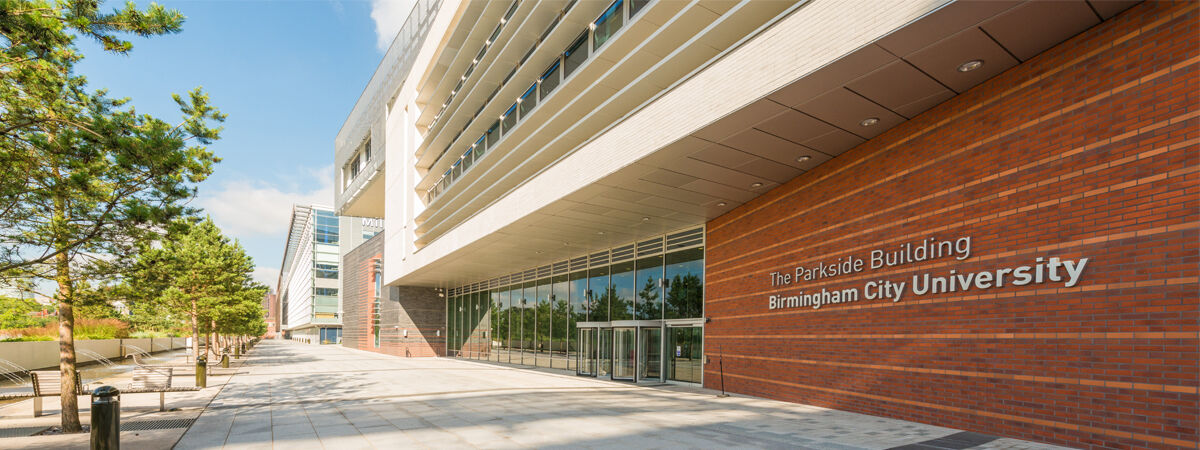
Our Facilities
Fashion and Textiles courses are based at our Parkside Building, which is part of our multi-million pound City Centre Campus development in the heart of Birmingham's Eastside development.
Our staff
Jasbir Kaur
Director of Postgraduate Studies in Fashion and Textiles
Jasbir is Director of Postgraduate Studies in Fashion and Textiles. Her early career began in commercial textile design, before moving into fashion research, and is now an internationally published author in the area of textiles, and the interrelationship between that and fashion.
More about JasbirNataliya Rozhin
Doctoral researcher
Nataliya Rozhin is a designer and PhD student focussing on design-led research and experimental fashion.
More about Nataliya











